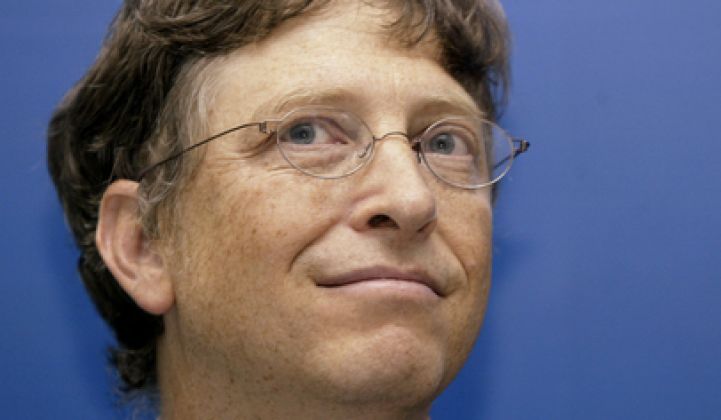Bill Gates just blogged on energy poverty. In that post, he agrees with the political scientist Bjorn Lomborg, who “argues that before poor countries can move to clean energy, poor families need access to cheap electricity so they don’t have to burn dung, cardboard, or twigs for heating and cooking. These dirty fuels produce indoor air pollution that is terrible for health (especially for children).”
In 2012, I wrote in the Huffington Post that Bill Gates had zero qualifications to understand energy and its costs. I also acknowledged that I am not qualified to run a global software company.
So, Bill Gates doesn’t know much about energy outside of his vested interests in nuclear power, and I don’t know much about running a software company outside of my bumbling with my Android apps. I say this about myself even though I have helped with smart metering and oversaw the global implementation for monitoring solar systems worldwide for SunEdison.
But Bill Gates has more money and power than I, as well as a powerful -- and wonderful -- charity. In this instance, however, his charity is misguided. And nothing is more dangerous than misguided charity.
Gates' misguided path starts with the fact that he cited a notorious climate confusionist, Bjorn Lomborg. Lomborg has stubbornly refused to acknowledge the fact that renewable energy is cost-competitive with fossil fuels as an energy source.
Given Gates' stature, framing energy poverty as a climate issue reveals a depth of ignorance that poses a serious problem. So here is reality.
Ending energy poverty has nothing to do with climate change
The International Energy Agency has released a series of reports outlining how the world can end darkness for the 1.3 billion people who currently lack power. Those reports have made clear that the agency's conservative approach (which relies in part on polluting power sources like coal) will only marginally increase carbon emissions. No one argues with this conclusion.
Ending energy poverty requires the right tool for the job: distributed energy
The truth is that an over-reliance on centralized grid extension and large-scale power plants will keep a billion people in the dark. It is time to recognize what even the IEA says is overwhelmingly necessary, but dramatically under-invested in: distributed renewable energy for those living beyond the grid.
To understand why this is so important, take a step back and consider the reaction if Gates wrote a blog suggesting that Mark Zuckerberg is a fool and that the solution for universal internet access around the world is connecting every home around the world via physical fiber-optic cable. The reaction would be riotous laughter. In emerging markets, they are busy ripping out copper and everyone is using wireless. Yet that’s exactly analogous to what Gates is proposing for energy.
No expert on energy access is paying any attention to Gates' folly on energy for the poor
They know that Gates' approach has been tried for 60 years and has failed miserably in almost every emerging market outside of China.
The truth is that knowledgeable entrepreneurs who have invested their lives and limited dollars into this space are making rational business decisions. Those decisions are focused on the cheapest way to deliver energy.
Energy is starting to look a lot like mobile phones, as distributed solutions leapfrog outdated and ineffective centralized networks. They have done so overwhelmingly out of the desire to power the poor -- not to solve climate change. They also happen to rely on the most affordable, effective and direct tool available: distributed clean energy that puts power directly in the hands of poor populations in a timeframe that has an impact.
For proof of the power of distributed energy, look at the growth rates in real-world markets -- not Gates’ blog
The World Bank’s Lighting Africa program clocked a 95 percent compound annual growth rate (CAGR) for solar products being sold beyond the grid in sub-Saharan Africa. In Bangladesh, the wildly successful IDCOL solar program has installed 3 million solar home systems at a whopping 60 percent CAGR over the past decade. After much deliberation, even the dispassionate new prime minister of India decided against grid extension in favor of using distributed energy to meet his 2019 goal of electrifying every family's residence.
In the meantime, grid extension has proceeded at incredibly marginal rates. Worse, 2.5 billion people who are connected to the grid receive power that is so unreliable that they are considered "under-electrified" by current grid extension efforts. The cheap reliable grid is a fallacy that is no longer cheap, nor reliable.
When it comes to energy poverty, Gates is arguing for outdated and ineffective solutions that will keep people energy-poor. It is time that we deploy our 21st century energy solutions and put power directly in the hands of the impoverished.
***
Jigar Shah is the founder of SunEdison and the author of Creating Climate Wealth: Unlocking the Impact Economy.



